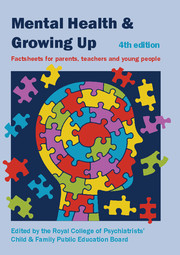Book contents
- Frontmatter
- Contents
- Contributors
- Factsheets for young people
- 1 Bipolar disorder
- 2 Cannabis and mental health
- 3 Cognitive–behavioural therapy (CBT)
- 4 Coping with stress
- 5 Depression
- 6 Drugs and alcohol
- 7 Exercise and mental health
- 8 Mental illness in a parent
- 9 Obsessive–compulsive disorder (OCD)
- 10 Psychosis
- 11 Schizophrenia
- 12 When bad things happen – overcoming adversity and developing resilience
- 13 Worries about weight and eating problems
- 14 Worries and anxieties
- 15 Who's who in child and adolescent mental health services (CAMHS)
- Factsheets for parents, carers and anyone who works with young people
11 - Schizophrenia
from Factsheets for young people
Published online by Cambridge University Press: 02 January 2018
- Frontmatter
- Contents
- Contributors
- Factsheets for young people
- 1 Bipolar disorder
- 2 Cannabis and mental health
- 3 Cognitive–behavioural therapy (CBT)
- 4 Coping with stress
- 5 Depression
- 6 Drugs and alcohol
- 7 Exercise and mental health
- 8 Mental illness in a parent
- 9 Obsessive–compulsive disorder (OCD)
- 10 Psychosis
- 11 Schizophrenia
- 12 When bad things happen – overcoming adversity and developing resilience
- 13 Worries about weight and eating problems
- 14 Worries and anxieties
- 15 Who's who in child and adolescent mental health services (CAMHS)
- Factsheets for parents, carers and anyone who works with young people
Summary
How common is it?
Schizophrenia rarely occurs before puberty and usually begins in the late teenage years. About 1 in 100 people will have schizophrenia over their lifetime.
How do I know if I have schizophrenia?
When a person has schizophrenia, they may have the difficulties described below as ‘positive’ or ‘negative’ symptoms. Some of the symptoms may seem to start suddenly, whereas others may creep in more gradually. You may have some or most of the following. Usually people have a few or most symptoms for some time (at least months) before they are diagnosed with schizophrenia.
Positive symptoms
This does not mean they are ‘good’ symptoms. They mean unusual thoughts or experiences as described below. They may feel really distressing. They can feel totally real to you and it may seem to you that other people don't understand or aren't taking you seriously.
• Unusual beliefs or delusions : these are beliefs which seem obviously untrue to others, but not to you. For example, when you are ill, you might strongly believe that there is a plot to harm you, you are being spied on through the TV or being taken over by aliens. These beliefs can obviously make you feel afraid or strange.
• Muddled thinking or thought disorder is when it is difficult to think straight. Sometimes it may feel that others do not understand what you are trying to say. Your ideas may feel jumbled up, but it is more than being muddled or confused.
• Unusual experiences called hallucinations are when you see, hear, smell or feel something that isn't really there, although you are convinced that it is. ‘Hearing voices’ is one of the most common hallucinations. This can be very frightening. It can make you believe that you are being ‘watched’ or ‘picked on’. Your friends or family may say that you are acting strangely. They may say that they hear you talking or laughing to yourself. Sometimes this is the only symptom you experience which makes it unlikely to be schizophrenia.
Negative symptoms
This does not mean they are ‘bad’ symptoms, just that they are about ‘not doing’ something. You may feel tired, not interested and not want to do normal things such as:
• go to school
• play sports
• see friends
• get washed and dressed
• do hobbies you used to enjoy.
- Type
- Chapter
- Information
- Mental Health and Growing UpFactsheets for Parents, Teachers and Young People, pp. 32 - 34Publisher: Royal College of PsychiatristsPrint publication year: 2013



